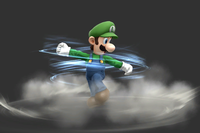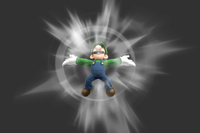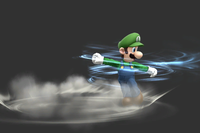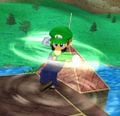Luigi Cyclone: Difference between revisions
m (→Customization) |
|||
| Line 120: | Line 120: | ||
==Customization== | ==Customization== | ||
Special Move customization is available in ''[[Super Smash Bros. 4]]''. These are the variations: | Special Move customization is available in ''[[Super Smash Bros. 4]]''. These are the variations: | ||
{{CustomSet|Luigi|Down|name1=Luigi Cyclone|desc1= | {{CustomSet|Luigi|Down|name1=Luigi Cyclone|desc1-ntsc=A spinning attack that can be moved sideways. Tap the button quickly to rise.|desc1-pal=Spins repeatedly. You can move sideways while spinning. Repeatedly press the button to rise.|name2=Mach Cyclone|desc2-ntsc=A spin that pushes opponents. Not much sideways movement, but can rise quite far.|desc2-pal=A spin that blows opponents away. Not much sideways movement, but can rise quite far.|name3=Clothesline Cyclone|desc3=A slow but powerful whirlwind slap that sends opponents flying sideways.}} | ||
# '''Luigi Cyclone''': Default. | # '''Luigi Cyclone''': Default. | ||
# '''Mach Cyclone''': Does no damage during the move (excluding the final hit) and instead possesses a small windbox. The end of the move deal 6% damage and impressive horizontal knockback, and Luigi can gain impressive height from the move's ending. Luigi's horizontal movement is severely limited, but in exchange, the effect of mashing is increased. Also has somewhat increased ending lag. | # '''Mach Cyclone''': Does no damage during the move (excluding the final hit) and instead possesses a small windbox. The end of the move deal 6% damage and impressive horizontal knockback, and Luigi can gain impressive height from the move's ending. Luigi's horizontal movement is severely limited, but in exchange, the effect of mashing is increased. Also has somewhat increased ending lag. | ||
Revision as of 21:41, January 31, 2022
| Luigi Cyclone | |
|---|---|
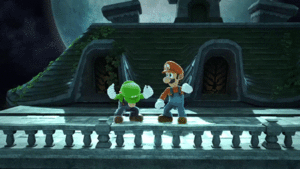 Luigi Cyclone in Super Smash Bros. Ultimate. | |
| User | Luigi |
| Universe | Mario |
| Article on Super Mario Wiki | Spin Jump |
Luigi Cyclone (ルイージサイクロン, Luigi Cyclone) is Luigi's down special move.
Overview
Luigi Cyclone is similar to the Mario Tornado in that it involves Luigi spinning around wildly with arms outstretched (with Luigi saying "Yahoo!" prior to Brawl) and finishes with a full-body stretching bash (with Luigi shouting starting with Brawl). Unlike the Mario Tornado, however, prior to Brawl, there were only two hits. To add, Luigi closes his eyes in fear when using the move (not in Smash 4).
It can be used as a recovery move by button-mashing the special button. For vertical distance, this works best after a jump in Super Smash Bros. Brawl, because the move carries Luigi's momentum with it, but if used while falling, it will be much more difficult to gain height.
It is generally perceived as being very difficult to get the full height due to the number of times the player needs to push the special button during the animation, especially in Melee compared to his brother's version. This move does not put Luigi into a helpless state, so the player can use the Super Jump Punch or Green Missile after.
In Super Smash Bros.
In the original Super Smash Bros., there are a total of two hits during the move: one at the beginning (when Luigi curls up and begins to spin), and one at the end (when Luigi sends out his hands), which deals 15% and 18% damage, respectively, with the latter dealing significantly more knockback than the former. Only one of the hitboxes can hit a particular enemy with a use of the move, however, acting more like a sex kick. The first incarnation of the move is not as difficult to use as a recovery move as the one in Melee, but is slightly more difficult than in Brawl. Otherwise, it is exactly the same as Mario Tornado. For a sure hit, it is mostly used to attack an airborne enemy from above by rising. It is usually considered Luigi's secondary KO'ing move after his Super Jump Punch. Notably, this variant is the only version of the move that comes out on frame 1, making it a notoriously effective combo breaker.
In Super Smash Bros. Melee
In Melee, Luigi Cyclone is Luigi's primary vertical recovery as long as the player has very quick tap speed, though if used in midair, it's possible to halt falling speed for a short time with decent horizontal movement. There are a total of 2 hits like in Smash 64, with one right at the beginning and one in the end, though the hits can now link each other, and Luigi has a much better sideways movement when the attack is used on the ground. This version of the cyclone has the best combo ability, but very low KO or gimp potential. If the Cyclone is used at the peak of Luigi's mid-air jump, it is much easier to gain height. However, unlike other Smash games, the Cyclone needs to be "charged" by having it finished or interrupted on the ground. It is also by far the hardest Cyclone to successfully maneuver, with only people with very fast tap frequence being able to do it correctly. It takes around twice the hand speed as a jumpless Rising Cyclone from Brawl. It is also a very quick out of shield move that can be used for approaches. It is a primary combo starter versus fast fallers or heavyweights. The first hit deals 8% damage, and the second deals 12% with stronger knockback (or 10% due to stale-move negation).
The height gained from the cyclone depends on how many times the player presses B during the startup animation:[1]
- Fewer than 5 presses results in a height loss.
- 5-7 presses will keep Luigi at the same height, though it can still be useful for horizontal recovery.
- 8-10 presses gives half of the maximum height.
- 12-13 presses gives 2/3 of the maximum height.
- 14-18 presses will give near-maximum height.
- 19 presses gives the maximum height.[2] This would require the B button to alternate between being held and relieved between each frame, and is believed impossible to achieve in normal human play.
Curiously, with certain combinations of characters, controller ports (only works for the player in the higher port), and stages, the Cyclone may start already charged. The full list of combinations (for the NTSC version) was found by OkamiBW in this SmashBoards post. In the PAL version it seems to only work for the player with the lower port, independent of character choice and on the stages Fountain of Dreams, Pokémon Stadium, Icicle Mountain, Onett, Big Blue and Poké Floats.
Combinations that start the game with Luigi Cyclone charged (NTSC)
| Character | Legal stages | Other stages |
|---|---|---|
| Bowser | Yoshi's Story, Pokémon Stadium, Battlefield | Great Bay, Corneria, Yoshi’s Island N64, Kongo Jungle N64 |
| Captain Falcon | Yoshi's Story, Pokémon Stadium | Icicle Mountain, Flat Zone, Yoshi’s Island, Mushroom Kingdom, Kongo Jungle N64 |
| Dr. Mario | Pokémon Stadium | Flat Zone, Temple, Poké Floats |
| Donkey Kong | Fountain of Dreams, Pokémon Stadium, Battlefield, Final Destination, Dream Land | Flat Zone, Rainbow Cruise, Temple, Onett, Mute City |
| Falco | Yoshi's Story, Battlefield, Final Destination | Corneria, Venom, Poké Floats |
| Fox | Yoshi's Island, Pokémon Stadium, Final Destination | Mushroom Kingdom, Brinstar Depths, Poké Floats |
| Ganondorf | Final Destination | Kongo Jungle, Corneria, Jungle Japes, Yoshi's Island, Brinstar, Mushroom Kingdom, Poké Floats, Yoshi’s Island N64 |
| Ice Climbers | None | Icicle Mountain, Princess Peach's Castle, Kongo Jungle, Great Bay, Corneria, Temple, Yoshi's Island, Green Greens, Mushroom Kingdom |
| Jigglypuff | Battlefield | Princess Peach's Castle, Kongo Jungle, Green Greens, Venom, Poké Floats, Mushroom Kingdom II, Yoshi’s Island N64 |
| Kirby | Pokémon Stadium, Battlefield | Corneria, Temple, Yoshi's Island, Mushroom Kingdom, Brinstar Depths, Yoshi’s Island N64 |
| Link | Pokémon Stadium | Icicle Mountain, Princess Peach's Castle, Kongo Jungle, Great Bay, Corneria, Jungle Japes, Temple, Green Greens, Brinstar, Mushroom Kingdom, Big Blue, Yoshi’s Island N64, Kongo Jungle N64 |
| Luigi | Yoshi's Story | Princess Peach's Castle, Jungle Japes, Temple, Venom, Onett, Mute City |
| Mario | None | Princess Peach's Castle, Fourside, Poké Floats, Mushroom Kingdom II |
| Marth | Final Destination, Dream Land | Icicle Mountain, Rainbow Cruise, Temple, Green Greens, Big Blue, Poké Floats, Mushroom Kingdom II |
| Mewtwo | Final Destination | Princess Peach's Castle, Great Bay, Flat Zone, Temple, Yoshi's Island, Green Greens, Venom, Mute City, Mushroom Kingdom II, Kongo Jungle N64 |
| Mr. Game & Watch | Yoshi's Story, Pokémon Stadium, Final Destination | Rainbow Cruise, Yoshi's Island, Green Greens, Big Blue, Poké Floats |
| Ness | Yoshi's Story, Fountain of Dreams, Final Destination | Rainbow Cruise, Temple, Mute City, Fourside, Big Blue, Poké Floats |
| Peach | Yoshi's Story, Fountain of Dreams, Pokémon Stadium, Final Destination | Rainbow Cruise, Temple, Green Greens, Brinstar, Onett, Mushroom Kingdom, Poké Floats |
| Pichu | Yoshi's Story, Pokémon Stadium | Princess Peach's Castle, Kongo Jungle, Jungle Japes, Venom, Brinstar Depths, Mushroom Kingdom II, Yoshi’s Island N64 |
| Pikachu | Pokémon Stadium, Battlefield | Princess Peach's Castle, Corneria, Yoshi's Island, Green Greens, Venom, Brinstar, Onett, Mute City, Mushroom Kingdom II |
| Roy | None | Icicle Mountain, Kongo Jungle, Jungle Japes, Green Greens, Venom, Mushroom Kingdom, Mushroom Kingdom II, Yoshi’s Island N64, Kongo Jungle N64 |
| Samus | Fountain of Dreams, Dream Land | Great Bay, Rainbow Cruise, Temple, Yoshi's Island, Onett, Mute City, Big Blue, Mushroom Kingdom II, Yoshi’s Island N64, Kongo Jungle N64 |
| Sheik | Fountain of Dreams, Battlefield, Final Destination | Kongo Jungle, Jungle Japes, Fourside, Big Blue, Poké Floats, Mushroom Kingdom II, Kongo Jungle N64 |
| Yoshi | Yoshi's Story, Fountain of Dreams, Battlefield, Final Destination | Rainbow Cruise, Venom, Brinstar, Onett, Fourside, Big Blue, Mushroom Kingdom II, Kongo Jungle N64 |
| Young Link | Fountain of Dreams, Pokémon Stadium, Battlefield, Final Destination | Princess Peach's Castle, Kongo Jungle, Corneria, Onett, Mute City, Kongo Jungle N64 |
| Zelda | Fountain of Dreams | Princess Peach's Castle, Kongo Jungle, Great Bay, Jungle Japes, Venom, Brinstar, Mushroom Kingdom, Fourside, Big Blue, Poké Floats, Mushroom Kingdom II, Kongo Jungle N64 |
In Super Smash Bros. Brawl
In Brawl, Luigi uses the Cyclone in a slightly different way. This time, his hands are extended with his palms facing up to make him more resemble a helicopter propeller, and his arms during the full-body bash stretch are extended more horizontally. While still able to travel across a stage surface very quickly, Brawl's Luigi Cyclone has more hits than Melee's (with no vacuum effect compared to Mario's version), less power, and is very good at gimping certain characters. The first four hits deal 2% damage with a semi-spike angle for each, with the last hit doing 4% damage with a vertical angle and high base knockback. The vertical recovery distance is now much easier to perform than its Melee counterpart, making it much more versatile. It has less vertical distance than the version from Smash 64 but has the most horizontal distance of all three games. The Cyclone gains the most vertical momentum in midair when implemented just after a jump, a property shared with Green Missile. Combining these two techniques with the standard recovery move (jumped GM→double-jumped Cyclone→Super Jump Punch) allow for dramatic aerial movement and recovery improvement. The Brawl Cyclone is also one of the better moves Luigi has to approach and bait, though arguably the worst variant in the series as an attack due to its unreliable loop hits. There are a few main techniques using the Cyclone in Brawl:
- Cyclone cancel (CC): Pressing down and the special button right before Luigi touches the ground allows him to instantly use the move again. [1]. This also allows Luigi to rise slightly on the ground if he taps the special button on the ground while moving.
- Jumpless rising cyclone: (JRC) Using the cyclone without jumping is much harder than using it with jumping. It takes around double the tap speed. However it is considered usually better as it allows Luigi to make a double jump afterward as well.
- Normal rising cyclone. (NRC): Using the cyclone with jumping is by far the easiest way to recover. It does however leave Luigi open for gimps as Luigi doesn't have a 2nd jump anymore otherwise.
- Stationary aerial cyclone. (SAC): Using the cyclone to keep Luigi in the same area in mid-air. Takes exactly half the tap speed as the other cyclones. Also known as a Half rising cyclone or HRC.
- Aerial cyclone gimp (ACG): Jumping and then using a fully powered cyclone to KO a character off the top (usually someone with a slow down aerial like Snake) or to fast fall and then fully tap cyclone off stage against someone's recovery, usually against Diddy Kong or Marth. Similar to Meta Knight's up aerial to tornado gimp, but less effective.
- Full rising cyclone (FRC): A fully vertical/horizontal cyclone.
In Super Smash Bros. 4
In Smash 4, Luigi Cyclone has similar traits to its Brawl incarnation, but its use for recovery has been made less viable; it gains significantly less vertical recovery distance, and it becomes as difficult as in Melee to mash to gain height if Luigi does not jump before using it or is not suffering hitlag from actually hitting opponents with it. In turn, the last hit of Luigi Cyclone has much stronger vertical knockback, and can KO at around 130% when closer to the upper blast line, however it deals 3% less damage to compensate for this, now dealing 9%. It was commonly used as a finisher after down throw before the 1.1.1 patch. Aesthetically, Luigi no longer closes his eyes in fear, instead keeping his eyes and mouth open. It can no longer semi-spike due to utilizing the autolink angle (though this makes the hits connect better) but in the air, if the penultimate hit connects and the final hit does not, the opponent will be sent downwards with deceptively high hitstun, making it an excellent gimping option.
In Super Smash Bros. Ultimate
In Ultimate, Luigi Cyclone has received a mixture of buffs and nerfs; the linking hits connect more reliably, the move deals more damage, it has gained a windbox that drags opponents into the move, it has more range, and now grants Luigi invincibility during its initial frames (frame 4–8 on the ground and frame 1–7 in the air), with the lattermost of these allowing the move to serve as a notoriously effective combo breaker. However, the move travels a much shorter distance even when button-mashed, completely removing its utility as a recovery option outside of a stalling tool, Luigi's horizontal travel distance with the move is much lower (especially on the ground), and the windbox and reduced knockback on the linking hits result in the move losing its ability to gimp recoveries from SSB4. In update 2.0.0, the final hit received increased knockback, improving the move's KO potential. The move additionally now boasts a KO confirm out of down throw.
A technique was discovered involving Luigi Cyclone, where if Luigi were to use the move at the edge of a platform and at the final frame of invincibility moved away from the platform, the invincibility would last for the entire duration of the move. This technique was called the "Super Cyclone", and could be used to avoid punishments for using the move and to edgeguard opponents. It was removed in update 3.1.0.
Customization
Special Move customization is available in Super Smash Bros. 4. These are the variations:
- Luigi Cyclone: Default.
- Mach Cyclone: Does no damage during the move (excluding the final hit) and instead possesses a small windbox. The end of the move deal 6% damage and impressive horizontal knockback, and Luigi can gain impressive height from the move's ending. Luigi's horizontal movement is severely limited, but in exchange, the effect of mashing is increased. Also has somewhat increased ending lag.
- Clothesline Cyclone: The individual hits of the move do not link into each other at all, but they deal high damage, with the initial hits being moderately strong semi-spikes and the final hit being a very powerful vertical launcher dealing 12% damage. The performance of the move is slower, with more startup and ending lag, and restricted horizontal movement. The move also provides almost no vertical height whatsoever, unless the gameplay speed is reduced, allowing TAS-like mashing speeds. Also, against a shielding opponent, the move can inflict up to 32% damage to the shield if all 3 hits connect, meaning it cannot always be safely shielded.
Instructional quotes
| The Luigi Cyclone sucks foes in and twirls them about. | ||
| Spin and strike foes. Rise by repeatedly pressing | ||
| Spins at high speed, catching opponents in the attack. Repeated presses cause him to float and move a bit. |
Origin
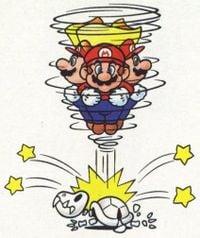
The Luigi Cyclone is likely based on the Spin Jump that originated in Super Mario World. The Spin Jump has lower vertical range than Luigi's jump but deals more damage, can jump on hazardous enemies, and can break rotating blocks. In Super Mario Galaxy, both Mario and Luigi have a spinning attack very similar to the Mario Tornado and Luigi Cyclone. The spinning attack from Super Mario Galaxy made them gain some vertical height when used in the air, just like Luigi Cyclone and Mario Tornado, although in Super Mario Galaxy the spin acted more like a double jump and is done only once instead of multiple times.
Gallery
Luigi Cyclone in Super Smash Bros. for Nintendo 3DS.
Luigi Cyclone in Super Smash Bros. for Wii U.
Names in other languages
Trivia
- Despite the move's rising capabilities, CPU Luigis will never attempt to recover with Luigi Cyclone in any of the first three Smash Bros. games, regardless of the level, and also never rise with it on any other occasion. CPU Luigi finally uses it to recover in Smash 4, but only at Level 9, and only immediately after a double jump. A similar trait is shared with Mario Tornado and Dr. Tornado.
- In Smash 4, Luigi Cyclone makes stronger "punching" sounds if used in the air and weaker sounds if started on the ground, despite having no damage differences between the two.
